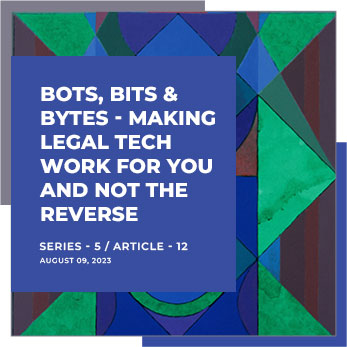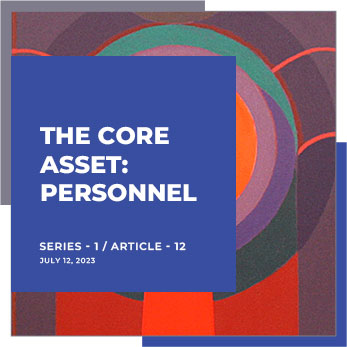Bitcoin, Ethereum, Dogecoin, Tether… the market for cryptocurrencies just keeps getting bigger. After determining that you could buy your Starbucks Coffee, Dallas Mavericks tickets, or Whole Foods veggies with the coins, you may have thought, ‘why not accept legal fees from clients via cryptocurrency?’
If so, you are not alone, and in fact, some states have already debated the issue and have come up with rules and regulations governing the use of cryptocurrencies as payment for your legal services. But, as with any innovation in the field of law, the ethics of the matter must be clearly understood.
Scissors, Paper, Rock?
Let us start with the basics. At one time, trading in goods and services was conducted using commodity money as the medium of exchange. Commodity money actually contained gold, silver, or another precious metal, thereby giving the coin itself intrinsic value. Next came representative money, which, contained no precious element itself (and was often printed on paper). It was deemed valuable because the government was issuing the currency guaranteed that its face value was backed by a certain value of gold or silver. With the issuance of fiat currency, governments and the people trading with the currency deemed their paper money to be the accepted medium of exchange, despite it having no intrinsic nor representative value with linkage to precious metals.
Blockchain as Your Banker
A fiat currency is introduced into the economy by a Central Bank, which lends money to financial institutions and thereafter regulates the supply. New physical banknotes are circulated by the Central Bank (Federal Reserve in the US) or a state’s Treasury. But how much new money needs to be created or injected into the economy in any given quarter is a function the Central Bank undertakes through its decisions
on buying and selling money. Globally, this is carried out by corresponding Central Banks such as the European Central Bank, Swiss National Bank, or People’s Bank of China.
So, who issues, regulates, and places a value on cryptocurrencies? No Central Bank issues cryptocurrencies, instead, the coins (or ‘tokens’ or ‘crypto’) are ‘mined’ via extremely complex algorithms in order to be put into circulation, and new transactions using, the coins are confirmed by way of a ‘blockchain ledger.’ Once in circulation, you can buy the coins using, you guessed it, fiat currency, as long as you have a digital wallet.
Property, Not Currency
There are over 1,300 cryptocurrencies in circulation, and today’s clients are eager to use that currency to pay for your legal services. But there is a problem with that premise crypto, is in fact, not money at all, but rather a ‘property asset.’ That classification was decided in the California case of Morici v. HashFast Technologies LLC, where the cryptocurrency Bitcoin was found not to be a currency in the sense of fiat currency but rather property. That decision aligned with the IRS’s opinion that crypto is property rather than currency for tax purposes.
Accepting Cryptocurrency as Payment
The first state to authorize the acceptance of cryptocurrency as payment for legal services was Nebraska, which adopted Nebraska Ethics Advisory Opinion for Lawyers No. 17–03 (September 11, 2017). Here, it advised lawyers to convert digital currency to US dollars upon receipt immediately. Due to the volatility of cryptocurrency values, it announced the sale of the cryptocurrency to ensure that the lawyer does not overcharge the client. Nebraska also addressed whether an attorney may receive digital currencies from third parties as payment for the benefit of a client and whether an attorney may hold digital currencies in a client trust account.
The New York City Bar Association (NYCBA) went further, rendering an opinion (NYCBA, Comm’n on Prof’l Ethics, Formal Op. 2019-5) that lawyers must comply with ABA Model Rule 1.8(a) when they accept cryptocurrency as a payment. In 2020, the Washington, DC bar approved the acceptance of cryptocurrency as payment for legal services as long as the fee agreement is ‘fair and reasonable’ and the lawyer can safeguard what the bar noted was virtual property. Payment in cryptocurrency, therefore, was considered akin to accepting payment in shares of stock, collectibles, etc.
ABA Ethics Considerations
Two ‘ethics’ issues may develop regarding accepting cryptocurrency as a means of payment for legal fees. First, under ABA Model Rule 1.5, a lawyer is prohibited from entering into an agreement calling for unreasonable fees. However, various scenarios can emerge in which a cryptocurrency price might change dramatically between the time of transfer from the client’s digital wallet to the lawyer’s, subsequently converting it. Even if the lawyer decides to retain the cryptocurrency in his own digital wallet, instant appreciation in value may also trigger a Rule 1.5 exposure.
The other ethical concern pertains to ABA Model Rule 1.8, which restricts a lawyer from entering into a business transaction with a client or acquiring an interest that is adverse to his client’s interest unless the conduct falls as an exception under the Rule. Although Rule 1.8 (a) generally pertains to fees paid by way of stocks, a security interest in a client’s property, or other goods, the various interpretations of cryptocurrency as a property asset raise the specter of Rule 1.8 implications.
Check Your State’s Rules
The increasing acceptance of cryptocurrencies by lawyers is all but a certainty, and as more states adopt opinions similar to those of Nebraska, New York, and Washington DC, the rules for accepting virtual currencies may indeed vary. However, by adhering to your own state’s opinions and guidelines promulgated, you will eliminate or at least reduce the risks involved.
“PARALEGALS ARE OFTEN HIRED FOR INTENSIVE SUPPORT ROLES WITHIN AN ATTORNEY’S CASELOAD….
…A WIDE RANGE OF TRULY SUBSTANTIVE LEGAL WORK CAN NOW BE LAWFULLY ASSIGNED TO A PARALEGAL”
Executive Summary
The Issue
The rising popularity of cryptocurrencies in today’s economy presents new ethical issues for attorneys and law firms who accept payment in these forms.
The Gravamen
Cryptocurrencies are not ‘pure’ forms of currency and carry a fair amount of risk, which may fall upon the client a scenario that potentially runs afoul of a lawyer’s ethical obligations.
The Path Forward
Keep abreast of your Bar Association’s guidance or directives on the issue. Ensure clients are fully apprised of the risks in paying for services by cryptocurrencies, and ‘cash-out’ cryptocurrency payments for banknotes without delay in order to avoid any inadvertent enrichment from fluctuations in the value of the client’s payments.
Action Items
Step 1:
As far as feasible, accept payment through traditional means until your jurisdiction provides reliable guidance on the issue.
Step 2:
If, by chance, you have a client keen on paying for legal services by cryptocurrency, then be sure to discuss and memorialize a set conversation rate or USD value for the payment.
Step 3:
Candidly discuss the risks with the client and treat the overall process as a business transaction under ABA Model Rule 1.8.
Step 4:
At the earliest convenience, have the payment converted back into traditional currency as price fluctuations in the value of the cryptocurrency can lead to allegations of unreasonable fee levying, which violates ABA Rule 1.5.
Further Readings
- https://cbaatthebar.chicagobar.org/2020/09/17/how-attorneys-can- accept-bitcoin-as-payment/
- https://www.ncbar.gov/for-lawyers/ethics/ethics-articles/is-it-ethical-for-lawyers-to-accept-bitcoins-and-other-cryptocurrencies/
- https://www.clio.com/blog/accept-bitcoin-law-firm/
- https://news.bloomberglaw.com/us-law-week/washington-d-c- lawyers-can-accept-cryptocurrency-as-payment
- https://www.americanbar.org/groups/litigation/committees/jiop/articles/2019/fall2019-ethics-of-accepting-cryptocurrency-as-payment/
- https://www.law.com/americanlawyer/2021/05/17/more-law-firms-welcome-crypto-payments-but-few-clients-are-taking-advantage/
- https://www.coindesk.com/policy/2020/07/01/dc-lawyers-can-now- accept-crypto-for-legal-fees/







